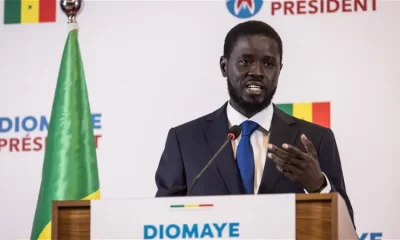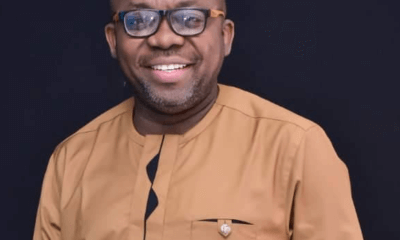National Issues
A Psychologist Raises The Intriguing Question: Could Nigeria’s Corruption Be Influenced By Both Spiritual And Biological Factors? -By John Egbeazien Oshodi
The narrative of James Ibori, former governor of Nigeria’s Delta State, serves as a stark reminder of domestic corruption’s intricate complexity. Found guilty of fraud and money laundering after a labyrinthine legal process spanning extradition from Dubai to the UK, Ibori’s case underscores the wide-reaching implications of corruption within local contexts.

Nigeria And Corruption: Delving Into Its Spiritual, Psychological, Societal, And Complex Dimensions
These individuals are not isolated instances; rather, they are emblematic of a broader issue within Nigeria. In fact, they can be seen as products of an environment where corruption has taken root and proliferated.
In grappling with the challenge of corruption, nations worldwide face a persistent and multifaceted adversary. Nigeria, in particular, finds itself entangled in a web of corruption that seems to possess spiritual, psychological, and societal underpinnings. This deeply rooted corruption takes on diverse forms, from financial malfeasance and embezzlement to the corrosive influence of bribery, nepotism, and the abuse of power. As corruption ingrains itself within the very framework of society, it becomes more than a mere sequence of individual acts; it morphs into a systemic issue that requires comprehensive solutions.
The far-reaching consequences of corruption, especially when it penetrates the upper echelons of government, are undeniable. It corrodes public trust, stymies economic progress, and exacerbates the already gaping chasm of inequality. To effectively combat this intricate menace, countries must erect formidable legal frameworks and institutions that specifically target corruption.
The case of Diezani Alison-Madueke which falls under what I call transnational corruption, the former Nigerian petroleum minister, stands as a poignant testament to corruption’s grave toll on Nigeria. Allegedly involved in accepting bribes in exchange for awarding lucrative oil and gas contracts during her tenure as Minister for Petroleum Resources, her actions spotlight the vulnerability of governmental structures to corruption’s insidious influence. These allegations encompass a spectrum of financial rewards, luxurious items, and properties, underscoring the urgency of confronting corruption that crosses national borders. The investigation into Alison-Madueke’s actions, undertaken by the National Crime Agency (NCA) in collaboration with international partners, highlights the global effort required to counteract corruption’s far-reaching effects.
The case of Nigerian senator Ike Ekweremadu lays bare an especially disconcerting facet of corruption—medical corruption. Convicted in the UK for orchestrating the trafficking of an individual to donate a kidney for his daughter, this instance of organ trafficking exemplifies corruption’s protean nature. Vulnerable individuals are exploited for personal gain, shattering fundamental human rights and ethical standards. These convictions, facilitated by modern slavery laws, underscore the imperative of fortified legal measures to confront such despicable crimes, imparting a critical lesson for Nigeria. Certain elites have even gone so far as to request leniency for Ike Ekweremadu despite his involvement in heinous crimes like slavery and organ trafficking. This disregard for the victims and the push for leniency highlight a deeply entrenched mindset that tolerates corruption, which is truly astonishing.
The narrative of James Ibori, former governor of Nigeria’s Delta State, serves as a stark reminder of domestic corruption’s intricate complexity. Found guilty of fraud and money laundering after a labyrinthine legal process spanning extradition from Dubai to the UK, Ibori’s case underscores the wide-reaching implications of corruption within local contexts. In the case of Ibori, it’s remarkable that despite his conviction, he retains his position as a political elite. In an astonishing turn of events, he has visited the new president in Aso Rock, the presidential residence, I believe at least twice or so, which is quite unbelievable.
These high-profile cases illuminate the necessity of shedding light on corruption, fostering awareness, and advocating for transformative change.
When corruption becomes entrenched within society, a collective response becomes paramount. Collaboration among citizens, government bodies, and international counterparts becomes indispensable in addressing the heart of the matter. The establishment of resilient, impartial institutions capable of investigating, prosecuting, and penalizing corruption assumes paramount importance. Transparent governance and decision-making mechanisms minimize avenues for corruption, while measures holding officials accountable galvanize a culture of integrity.
In the pursuit of cultural transformation, citizen engagement and education are pivotal. Achieving this metamorphosis demands not just legal and institutional reforms but also a sustained campaign to reshape societal norms, attitudes, and behaviors. Instilling ethical values from a tender age can empower future generations to uphold justice and accountability.
Perceiving corruption as a phenomenon that spans the spiritual, psychological, and societal realms underscores the deep-seated infiltration into multiple dimensions of society. This is why one might be almost tempted to suggest that corruption is possibly spiritual, near biological, and deeply psychological. However, it’s crucial to clarify that these tendencies don’t emanate from a biological condition. Rather, they arise from a complex interplay involving psychological, social, and environmental factors. The root of corruption lies within this intricate interplay, requiring a holistic approach to its eradication. This approach must account for the wide range of motivations and experiences that contribute to shaping human behavior.
Corruption’s influence is pervasive, extending across schools, training grounds, recruitment venues, transportation sites, businesses, NGOs, workplaces, hospitals, admission centers, licensing offices, mortuary offices, banks, throughfares, public offices, holy grounds, media, and beyond. This mindset of corruption deeply permeates various facets of society, casting a wide and serious net. It underscores a concerning reality: the depth and breadth of corruption’s grip are far-reaching. From educational institutions to commercial enterprises, and even to sacred spaces, corruption’s insidious presence raises serious questions about the ethical fiber of society.
In Nigeria’s journey toward transformation, the initial stride involves acknowledging the extent of corruption’s grasp. By nurturing values, ethics, and an unyielding commitment to change from an early age, Nigeria can extricate itself from the clutches of corruption. While the path ahead is fraught with challenges, comprehending the multi-dimensional nature of corruption is the foundation for genuine change. This transformation necessitates concerted collaboration, education, and an unwavering dedication to upholding integrity, ultimately forging a society that is more equitable and just.

John Egbeazien Oshodi
Professor John Egbeazien Oshodi, who was born in Uromi, Edo State, Nigeria, to a father who served in the Nigeria police for 37 years, is an American-based police and prison scientist and forensic, clinical, and legal psychologist. A government consultant on matters of forensic-clinical psychological services in the USA; and a former interim associate dean and assistant professor at Broward College, Florida. The Founder of the Dr. John Egbeazien Oshodi Foundation, Center for Psychological Health and Behavioral Change in African Settings. A former Secretary-General of the Nigeria Psychological Association. In 2011, he introduced state-of-the-art forensic psychology into Nigeria through N.U.C. and Nasarawa State University, where he served in the Department of Psychology as an Associate Professor. He has taught at various universities and colleges including Florida memorial University, Florida International University, Broward college, Lynn University, and a contributing faculty member at the Weldios university in Benin Republic, Nexus International University, Uganda, Nova Southeastern University and Walden University in USA.
John.Oshodi@mail.waldenu.edu



















